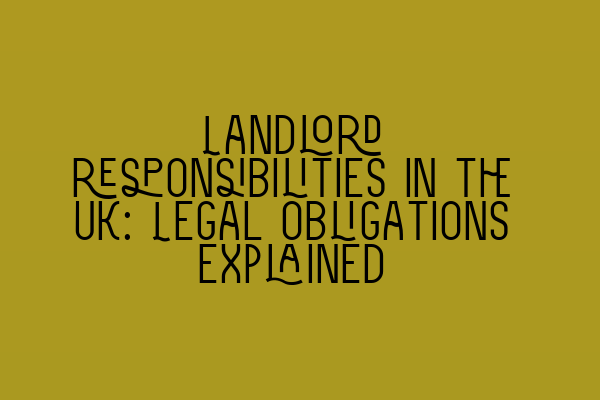Landlord Responsibilities in the UK: Legal Obligations Explained
Welcome to SQE Property Law & Land Law, where we specialize in providing expert advice on all aspects of property law in the UK. In this comprehensive guide, we will explore the legal obligations and responsibilities of landlords in the UK. Whether you are a first-time landlord or an experienced property owner, understanding your legal obligations is crucial to ensure compliance and avoid potential legal issues.
1. Health and Safety Obligations
As a landlord, you have a legal duty to ensure that your properties are safe and meet the required health and safety standards. This includes conducting regular inspections, carrying out necessary repairs, and providing adequate fire safety measures. Failure to meet these obligations can result in serious consequences and legal liabilities.
To learn more about legal challenges in property transactions, click here.
2. Tenancy Agreements and Deposit Protection
Before renting out your property, it is essential to have a written tenancy agreement that outlines the rights and responsibilities of both the landlord and the tenant. This agreement should comply with the relevant legislation, such as the Housing Act 2004. Additionally, as a landlord, you must protect your tenant’s deposit in an approved tenancy deposit scheme within 30 days of receiving it.
To avoid common pitfalls in property law and enhance your understanding, read our article on avoiding common pitfalls.
3. Maintenance and Repairs
It is your responsibility as a landlord to ensure that your property is well-maintained and in a good state of repair. This includes addressing any issues promptly, such as plumbing or electrical problems, and maintaining the general upkeep of the property. Regular inspections can help identify potential maintenance issues before they become major problems.
4. Gas and Electrical Safety
Gas and electrical safety are of utmost importance in rental properties. As a landlord, you must conduct annual gas safety checks by a Gas Safe registered engineer and provide the tenant with a copy of the gas safety certificate. Additionally, electrical installations and appliances must be safe and regularly checked to prevent accidents and comply with the Electrical Safety Standards in the Private Rented Sector (England) Regulations 2020.
5. Right of Entry and Privacy
While you do have the right to enter your property for certain reasons, such as to carry out repairs or inspections, you must provide reasonable notice to your tenants and respect their right to privacy. Typically, 24-48 hours’ notice is considered reasonable, except in the case of emergencies.
6. Discrimination and Equality
Landlords must adhere to anti-discrimination laws and ensure that they do not discriminate against tenants based on protected characteristics, such as race, gender, religion, or disability. This applies to all aspects of the tenancy, from advertising the property to selecting tenants and making decisions regarding tenancy renewals or terminations.
7. Ending a Tenancy
When it comes to ending a tenancy, there are specific legal procedures that must be followed. This includes providing the tenant with the appropriate notice period and complying with the requirements set out in the relevant legislation.
For further assistance with land law revision and exam preparation, check out our article on ace your exam preparation.
Conclusion
Being a landlord comes with various legal responsibilities and obligations. By understanding and fulfilling these obligations, you can ensure the smooth running of your tenancies, maintain positive relationships with your tenants, and avoid unnecessary legal issues. Remember, seeking legal advice from a qualified property law solicitor can provide you with the guidance you need to navigate the complexities of landlord responsibilities in the UK.
For real-world scenarios and case studies in property law, visit our article on real-world scenarios.
